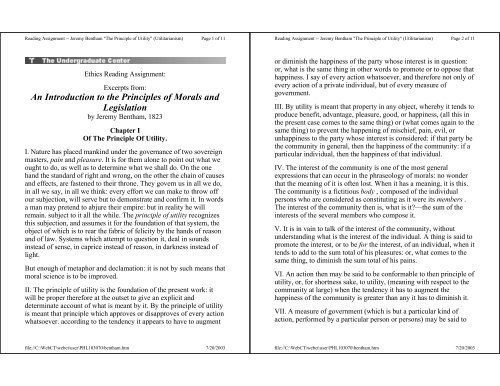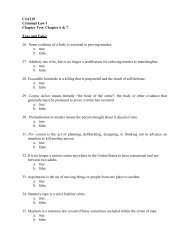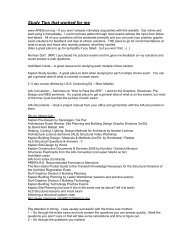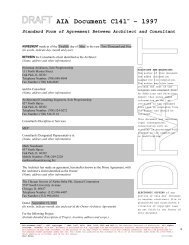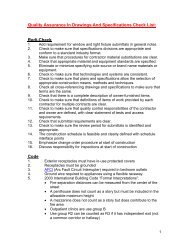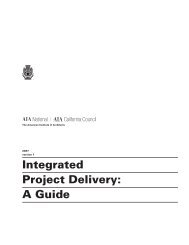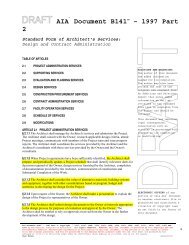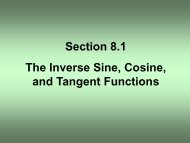An Introduction to the Principles of Morals and Legislation
An Introduction to the Principles of Morals and Legislation
An Introduction to the Principles of Morals and Legislation
Create successful ePaper yourself
Turn your PDF publications into a flip-book with our unique Google optimized e-Paper software.
Reading Assignment -- Jeremy Bentham "The Principle <strong>of</strong> Utility" (Utilitarianism)Page 1 <strong>of</strong> 11Reading Assignment -- Jeremy Bentham "The Principle <strong>of</strong> Utility" (Utilitarianism)Page 2 <strong>of</strong> 11Ethics Reading Assignment:Excerpts from:<strong>An</strong> <strong>Introduction</strong> <strong>to</strong> <strong>the</strong> <strong>Principles</strong> <strong>of</strong> <strong>Morals</strong> <strong>and</strong><strong>Legislation</strong>by Jeremy Bentham, 1823Chapter IOf The Principle Of Utility.I. Nature has placed mankind under <strong>the</strong> governance <strong>of</strong> two sovereignmasters, pain <strong>and</strong> pleasure. It is for <strong>the</strong>m alone <strong>to</strong> point out what weought <strong>to</strong> do, as well as <strong>to</strong> determine what we shall do. On <strong>the</strong> oneh<strong>and</strong> <strong>the</strong> st<strong>and</strong>ard <strong>of</strong> right <strong>and</strong> wrong, on <strong>the</strong> o<strong>the</strong>r <strong>the</strong> chain <strong>of</strong> causes<strong>and</strong> effects, are fastened <strong>to</strong> <strong>the</strong>ir throne. They govern us in all we do,in all we say, in all we think: every effort we can make <strong>to</strong> throw <strong>of</strong>four subjection, will serve but <strong>to</strong> demonstrate <strong>and</strong> confirm it. In wordsa man may pretend <strong>to</strong> abjure <strong>the</strong>ir empire: but in reality he willremain. subject <strong>to</strong> it all <strong>the</strong> while. The principle <strong>of</strong> utility recognizesthis subjection, <strong>and</strong> assumes it for <strong>the</strong> foundation <strong>of</strong> that system, <strong>the</strong>object <strong>of</strong> which is <strong>to</strong> rear <strong>the</strong> fabric <strong>of</strong> felicity by <strong>the</strong> h<strong>and</strong>s <strong>of</strong> reason<strong>and</strong> <strong>of</strong> law. Systems which attempt <strong>to</strong> question it, deal in soundsinstead <strong>of</strong> sense, in caprice instead <strong>of</strong> reason, in darkness instead <strong>of</strong>light.But enough <strong>of</strong> metaphor <strong>and</strong> declamation: it is not by such means thatmoral science is <strong>to</strong> be improved.II. The principle <strong>of</strong> utility is <strong>the</strong> foundation <strong>of</strong> <strong>the</strong> present work: itwill be proper <strong>the</strong>refore at <strong>the</strong> outset <strong>to</strong> give an explicit <strong>and</strong>determinate account <strong>of</strong> what is meant by it. By <strong>the</strong> principle <strong>of</strong> utilityis meant that principle which approves or disapproves <strong>of</strong> every actionwhatsoever. according <strong>to</strong> <strong>the</strong> tendency it appears <strong>to</strong> have <strong>to</strong> augmen<strong>to</strong>r diminish <strong>the</strong> happiness <strong>of</strong> <strong>the</strong> party whose interest is in question:or, what is <strong>the</strong> same thing in o<strong>the</strong>r words <strong>to</strong> promote or <strong>to</strong> oppose thathappiness. I say <strong>of</strong> every action whatsoever, <strong>and</strong> <strong>the</strong>refore not only <strong>of</strong>every action <strong>of</strong> a private individual, but <strong>of</strong> every measure <strong>of</strong>government.III. By utility is meant that property in any object, whereby it tends <strong>to</strong>produce benefit, advantage, pleasure, good, or happiness, (all this in<strong>the</strong> present case comes <strong>to</strong> <strong>the</strong> same thing) or (what comes again <strong>to</strong> <strong>the</strong>same thing) <strong>to</strong> prevent <strong>the</strong> happening <strong>of</strong> mischief, pain, evil, orunhappiness <strong>to</strong> <strong>the</strong> party whose interest is considered: if that party be<strong>the</strong> community in general, <strong>the</strong>n <strong>the</strong> happiness <strong>of</strong> <strong>the</strong> community: if aparticular individual, <strong>the</strong>n <strong>the</strong> happiness <strong>of</strong> that individual.IV. The interest <strong>of</strong> <strong>the</strong> community is one <strong>of</strong> <strong>the</strong> most generalexpressions that can occur in <strong>the</strong> phraseology <strong>of</strong> morals: no wonderthat <strong>the</strong> meaning <strong>of</strong> it is <strong>of</strong>ten lost. When it has a meaning, it is this.The community is a fictitious body , composed <strong>of</strong> <strong>the</strong> individualpersons who are considered as constituting as it were its members .The interest <strong>of</strong> <strong>the</strong> community <strong>the</strong>n is, what is it?—<strong>the</strong> sum <strong>of</strong> <strong>the</strong>interests <strong>of</strong> <strong>the</strong> several members who compose it.V. It is in vain <strong>to</strong> talk <strong>of</strong> <strong>the</strong> interest <strong>of</strong> <strong>the</strong> community, withoutunderst<strong>and</strong>ing what is <strong>the</strong> interest <strong>of</strong> <strong>the</strong> individual. A thing is said <strong>to</strong>promote <strong>the</strong> interest, or <strong>to</strong> be for <strong>the</strong> interest, <strong>of</strong> an individual, when ittends <strong>to</strong> add <strong>to</strong> <strong>the</strong> sum <strong>to</strong>tal <strong>of</strong> his pleasures: or, what comes <strong>to</strong> <strong>the</strong>same thing, <strong>to</strong> diminish <strong>the</strong> sum <strong>to</strong>tal <strong>of</strong> his pains.VI. <strong>An</strong> action <strong>the</strong>n may be said <strong>to</strong> be conformable <strong>to</strong> <strong>the</strong>n principle <strong>of</strong>utility, or, for shortness sake, <strong>to</strong> utility, (meaning with respect <strong>to</strong> <strong>the</strong>community at large) when <strong>the</strong> tendency it has <strong>to</strong> augment <strong>the</strong>happiness <strong>of</strong> <strong>the</strong> community is greater than any it has <strong>to</strong> diminish it.VII. A measure <strong>of</strong> government (which is but a particular kind <strong>of</strong>action, performed by a particular person or persons) may be said <strong>to</strong>file://C:\WebCT\webct\user\PHL103070\bentham.htm7/20/2003file://C:\WebCT\webct\user\PHL103070\bentham.htm7/20/2003
Reading Assignment -- Jeremy Bentham "The Principle <strong>of</strong> Utility" (Utilitarianism)Page 3 <strong>of</strong> 11Reading Assignment -- Jeremy Bentham "The Principle <strong>of</strong> Utility" (Utilitarianism)Page 4 <strong>of</strong> 11be conformable <strong>to</strong> or dictated by <strong>the</strong> principle <strong>of</strong> utility, when in likemanner <strong>the</strong> tendency which it has <strong>to</strong> augment <strong>the</strong> happiness <strong>of</strong> <strong>the</strong>community is greater than any which it has <strong>to</strong> diminish it.Bentham is saying that governmentsshould act in ways that increase <strong>the</strong>over-all happiness <strong>of</strong> <strong>the</strong> society. Doyou think that governments shouldalways act <strong>to</strong> increase <strong>the</strong> over-allhappiness, if that makes a few peoplevery unhappy?Your name?Send information nowClear form <strong>and</strong> start overVIII. When an action, or in particular a measure <strong>of</strong> government, issupposed by a man <strong>to</strong> be conformable <strong>to</strong> <strong>the</strong> principle <strong>of</strong> utility, itmay be convenient, for <strong>the</strong> purposes <strong>of</strong> discourse, <strong>to</strong> imagine a kind<strong>of</strong> law or dictate, called a law or dictate <strong>of</strong> utility: <strong>and</strong> <strong>to</strong> speak <strong>of</strong> <strong>the</strong>action in question, as being conformable <strong>to</strong> such law or dictate.IX. A man may be said <strong>to</strong> be a partizan <strong>of</strong> <strong>the</strong> principle <strong>of</strong> utility,when <strong>the</strong> approbation or disapprobation he annexes <strong>to</strong> any action, or<strong>to</strong> any measure, is determined by <strong>and</strong> proportioned <strong>to</strong> <strong>the</strong> tendencywhich he conceives it <strong>to</strong> have <strong>to</strong> augment or <strong>to</strong> diminish <strong>the</strong>happiness <strong>of</strong> <strong>the</strong> community: or in o<strong>the</strong>r words, <strong>to</strong> its conformity orunconformity <strong>to</strong> <strong>the</strong> laws or dictates <strong>of</strong> utility.X. Of an action that is conformable <strong>to</strong> <strong>the</strong> principle <strong>of</strong> utility one mayalways say ei<strong>the</strong>r that it is one that ought <strong>to</strong> be done, or at least that itis not one that ought not <strong>to</strong> be done. One may say also, that it is rightit should be done; at least that it is not wrong it should be done: that itis a right action; at least that it is not a wrong action. When thusinterpreted, <strong>the</strong> words ought , <strong>and</strong> right <strong>and</strong> wrong <strong>and</strong> o<strong>the</strong>rs <strong>of</strong> thatstamp, have a meaning: when o<strong>the</strong>rwise, <strong>the</strong>y have none.XI. Has <strong>the</strong> rectitude <strong>of</strong> this principle been ever formally contested?It should seem that it had, by those who have not known what <strong>the</strong>yhave been meaning. Is it susceptible <strong>of</strong> any direct pro<strong>of</strong>? it shouldseem not: for that which is used <strong>to</strong> prove every thing else, cannotitself be proved: a chain <strong>of</strong> pro<strong>of</strong>s must have <strong>the</strong>ir commencementsomewhere. To give such pro<strong>of</strong> is as impossible as it is needless.XII. Not that <strong>the</strong>re is or ever has been that human creature atbreathing, however stupid or perverse, who has not on many, perhapson most occasions <strong>of</strong> his life, deferred <strong>to</strong> it. By <strong>the</strong> naturalconstitution <strong>of</strong> <strong>the</strong> human frame, on most occasions <strong>of</strong> <strong>the</strong>ir lives menin general embrace this principle, without thinking <strong>of</strong> it: if not for <strong>the</strong>ordering <strong>of</strong> <strong>the</strong>ir own actions, yet for <strong>the</strong> trying <strong>of</strong> <strong>the</strong>ir own actions,as well as <strong>of</strong> those <strong>of</strong> o<strong>the</strong>r men. There have been, at <strong>the</strong> same time,not many perhaps, even <strong>of</strong> <strong>the</strong> most intelligent, who have beendisposed <strong>to</strong> embrace it purely <strong>and</strong> without reserve. There are evenfew who have not taken some occasion or o<strong>the</strong>r <strong>to</strong> quarrel with it,ei<strong>the</strong>r on account <strong>of</strong> <strong>the</strong>ir not underst<strong>and</strong>ing always how <strong>to</strong> apply it,file://C:\WebCT\webct\user\PHL103070\bentham.htm7/20/2003file://C:\WebCT\webct\user\PHL103070\bentham.htm7/20/2003
Reading Assignment -- Jeremy Bentham "The Principle <strong>of</strong> Utility" (Utilitarianism)Page 5 <strong>of</strong> 11Reading Assignment -- Jeremy Bentham "The Principle <strong>of</strong> Utility" (Utilitarianism)Page 6 <strong>of</strong> 11or on account <strong>of</strong> some prejudice or o<strong>the</strong>r which <strong>the</strong>y were afraid <strong>to</strong>examine in<strong>to</strong>, or could not bear <strong>to</strong> part with. For such is <strong>the</strong> stuff thatman is made <strong>of</strong>: in principle <strong>and</strong> in practice, in a right track <strong>and</strong> in awrong one, <strong>the</strong> rarest <strong>of</strong> all human qualities is consistency.XIII. When a man attempts <strong>to</strong> combat <strong>the</strong> principle <strong>of</strong> utility, it iswith reasons drawn, without his being aware <strong>of</strong> it, from that veryprinciple itself. His arguments, if <strong>the</strong>y prove any thing, prove not that<strong>the</strong> principle is wrong , but that, according <strong>to</strong> <strong>the</strong> applications hesupposes <strong>to</strong> be made <strong>of</strong> it, it is misapplied . Is it possible for a man <strong>to</strong>move <strong>the</strong> earth? Yes; but he must first find out ano<strong>the</strong>r earth <strong>to</strong> st<strong>and</strong>upon.XIV. To disprove <strong>the</strong> propriety <strong>of</strong> it by arguments is impossible; but,from <strong>the</strong> causes that have been mentioned, or from some confused orpartial view <strong>of</strong> it, a man may happen <strong>to</strong> be disposed not <strong>to</strong> relish it.Where this is <strong>the</strong> case, if he thinks <strong>the</strong> settling <strong>of</strong> his opinions on sucha subject worth <strong>the</strong> trouble, let him take <strong>the</strong> following steps, <strong>and</strong> atlength, perhaps, he may come <strong>to</strong> reconcile himself <strong>to</strong> it.1. Let him settle with himself, whe<strong>the</strong>r he would wish <strong>to</strong> discard thisprinciple al<strong>to</strong>ge<strong>the</strong>r; if so, let him consider what it is that all hisreasonings (in matters <strong>of</strong> politics especially) can amount <strong>to</strong>?2. If he would, let him settle with himself, whe<strong>the</strong>r he would judge<strong>and</strong> act without any principle, or whe<strong>the</strong>r <strong>the</strong>re is any o<strong>the</strong>r he wouldjudge an act by?3. If <strong>the</strong>re be, let him examine <strong>and</strong> satisfy himself whe<strong>the</strong>r <strong>the</strong>principle he thinks he has found is really any separate intelligibleprinciple; or whe<strong>the</strong>r it be not a mere principle in words, a kind <strong>of</strong>phrase, which at bot<strong>to</strong>m expresses nei<strong>the</strong>r more nor less than <strong>the</strong>mere averment <strong>of</strong> his own unfounded sentiments; that is, what inano<strong>the</strong>r person he might be apt <strong>to</strong> call caprice?4. If he is inclined <strong>to</strong> think that his own approbation ordisapprobation, annexed <strong>to</strong> <strong>the</strong> idea <strong>of</strong> an act, without any regard <strong>to</strong>its consequences, is a sufficient foundation for him <strong>to</strong> judge <strong>and</strong> actupon, let him ask himself whe<strong>the</strong>r his sentiment is <strong>to</strong> be a st<strong>and</strong>ard <strong>of</strong>right <strong>and</strong> wrong, with respect <strong>to</strong> every o<strong>the</strong>r man, or whe<strong>the</strong>r everyman's sentiment has <strong>the</strong> same privilege <strong>of</strong> being a st<strong>and</strong>ard <strong>to</strong> itself?5. In <strong>the</strong> first case, let him ask himself whe<strong>the</strong>r his principle is notdespotical, <strong>and</strong> hostile <strong>to</strong> all <strong>the</strong> rest <strong>of</strong> human race?6. In <strong>the</strong> second case, whe<strong>the</strong>r it is not anarchial, <strong>and</strong> whe<strong>the</strong>r at thisrate <strong>the</strong>re are not as many different st<strong>and</strong>ards <strong>of</strong> right <strong>and</strong> wrong as<strong>the</strong>re are men? <strong>and</strong> whe<strong>the</strong>r even <strong>to</strong> <strong>the</strong> same man, <strong>the</strong> same thing,which is right <strong>to</strong>-day, may not (without <strong>the</strong> least change in its nature)be wrong <strong>to</strong>-morrow? <strong>and</strong> whe<strong>the</strong>r <strong>the</strong> same thing is not right <strong>and</strong>wrong in <strong>the</strong> same place at <strong>the</strong> same time? <strong>and</strong> in ei<strong>the</strong>r case, whe<strong>the</strong>rall argument is not at an end? <strong>and</strong> whe<strong>the</strong>r, when two men have said,“I like this”, <strong>and</strong> “I don't like it”, <strong>the</strong>y can (upon such a principle)have any thing more <strong>to</strong> say?7. If he should have said <strong>to</strong> himself, No: for that <strong>the</strong> sentiment whichhe proposes as a st<strong>and</strong>ard must be grounded on reflection, let him sayon what particulars <strong>the</strong> reflection is <strong>to</strong> turn? if on particulars havingrelation <strong>to</strong> <strong>the</strong> utility <strong>of</strong> <strong>the</strong> act, <strong>the</strong>n let him say whe<strong>the</strong>r this is notdeserting his own principle, <strong>and</strong> borrowing assistance from that veryone in opposition <strong>to</strong> which he sets it up: or if not on those particulars,on what o<strong>the</strong>r particulars?8. If he should be for compounding <strong>the</strong> matter, <strong>and</strong> adopting his ownprinciple in part, <strong>and</strong> <strong>the</strong> principle <strong>of</strong> utility in part, let him say howfar he will adopt it?9. When he has settled with himself where he will s<strong>to</strong>p, <strong>the</strong>n let himask himself how he justifies <strong>to</strong> himself <strong>the</strong> adopting it so far? <strong>and</strong>why he will not adopt it any far<strong>the</strong>r?10. Admitting any o<strong>the</strong>r principle than <strong>the</strong> principle <strong>of</strong> utility <strong>to</strong> be afile://C:\WebCT\webct\user\PHL103070\bentham.htm7/20/2003file://C:\WebCT\webct\user\PHL103070\bentham.htm7/20/2003
Reading Assignment -- Jeremy Bentham "The Principle <strong>of</strong> Utility" (Utilitarianism)Page 7 <strong>of</strong> 11Reading Assignment -- Jeremy Bentham "The Principle <strong>of</strong> Utility" (Utilitarianism)Page 8 <strong>of</strong> 11right principle, a principle that it is right for a man <strong>to</strong> pursue;admitting (what is not true) that <strong>the</strong> word right can have a meaningwithout reference <strong>to</strong> utility, let him say whe<strong>the</strong>r <strong>the</strong>re is any suchthing as a motive that a man can have <strong>to</strong> pursue <strong>the</strong> dictates <strong>of</strong> it: if<strong>the</strong>re is, let him say what that motive is, <strong>and</strong> how it is <strong>to</strong> bedistinguished from those which enforce <strong>the</strong> dictates <strong>of</strong> utility: if not,<strong>the</strong>n lastly let him say what it is this o<strong>the</strong>r principle can be good for?. . . .Chapter IVValue <strong>of</strong> a Lot <strong>of</strong> Pleasure or Pain, how <strong>to</strong> be MeasuredI. Pleasures <strong>the</strong>n, <strong>and</strong> <strong>the</strong> avoidance <strong>of</strong> pains, are <strong>the</strong> ends that <strong>the</strong>legisla<strong>to</strong>r has in view; it behoves him <strong>the</strong>refore <strong>to</strong> underst<strong>and</strong> <strong>the</strong>irvalue. Pleasures <strong>and</strong> pains are <strong>the</strong> instruments he has <strong>to</strong> work with: itbehoves him <strong>the</strong>refore <strong>to</strong> underst<strong>and</strong> <strong>the</strong>ir force, which is again, ino<strong>the</strong>r words, <strong>the</strong>ir value.II. To a person considered by himself, <strong>the</strong> value <strong>of</strong> a pleasure or painconsidered by itself, will be greater or less, according <strong>to</strong> <strong>the</strong> fourfollowing circumstances:1. Its intensity.2. Its duration.3. Its certainty or uncertainty.4. Its propinquity or remoteness.III. These are <strong>the</strong> circumstances which are <strong>to</strong> be considered inestimating a pleasure or a pain considered each <strong>of</strong> <strong>the</strong>m by itself. Butwhen <strong>the</strong> value <strong>of</strong> any pleasure or pain is considered for <strong>the</strong> purpose<strong>of</strong> estimating <strong>the</strong> tendency <strong>of</strong> any act by which it is produced, <strong>the</strong>reare two o<strong>the</strong>r circumstances <strong>to</strong> be taken in<strong>to</strong> <strong>the</strong> account; <strong>the</strong>se are,5. Its fecundity, or <strong>the</strong> chance it has <strong>of</strong> being followed by sensations<strong>of</strong> <strong>the</strong> same kind: that is, pleasures, if it be a pleasure: pains, if it be apain.6. Its purity, or <strong>the</strong> chance it has <strong>of</strong> not being followed by sensations<strong>of</strong> <strong>the</strong> opposite kind: that is, pains, if it be a pleasure: pleasures, if itbe a pain.These two last, however, are in strictness scarcely <strong>to</strong> be deemedproperties <strong>of</strong> <strong>the</strong> pleasure or <strong>the</strong> pain itself; <strong>the</strong>y are not, <strong>the</strong>refore, instrictness <strong>to</strong> be taken in<strong>to</strong> <strong>the</strong> account <strong>of</strong> <strong>the</strong> value <strong>of</strong> that pleasure orthat pain. They are in strictness <strong>to</strong> be deemed properties only <strong>of</strong> <strong>the</strong>act, or o<strong>the</strong>r event, by which such pleasure or pain has beenproduced; <strong>and</strong> accordingly are only <strong>to</strong> be taken in<strong>to</strong> <strong>the</strong> account <strong>of</strong> <strong>the</strong>tendency <strong>of</strong> such act or such event.IV. To a number <strong>of</strong> persons, with reference <strong>to</strong> each <strong>of</strong> whom <strong>to</strong> <strong>the</strong>value <strong>of</strong> a pleasure or a pain is considered, it will be greater or less,according <strong>to</strong> seven circumstances: <strong>to</strong> wit, <strong>the</strong> six preceding ones; viz.1. Its intensity.2. Its duration.3. Its certainty or uncertainty.4. Its propinquity or remoteness.5. Its fecundity.6. Its purity.<strong>An</strong>d one o<strong>the</strong>r; <strong>to</strong> wit:7. Its extent; that is, <strong>the</strong> number <strong>of</strong> persons <strong>to</strong> whom it extends; or (ino<strong>the</strong>r words) who are affected by it.V. To take an exact account <strong>the</strong>n <strong>of</strong> <strong>the</strong> general tendency <strong>of</strong> any act,by which <strong>the</strong> interests <strong>of</strong> a community are affected, proceed asfollows. Begin with any one person <strong>of</strong> those whose interests seemmost immediately <strong>to</strong> be affected by it: <strong>and</strong> take an account,I. Of <strong>the</strong> value <strong>of</strong> each distinguishable pleasure which appears <strong>to</strong> befile://C:\WebCT\webct\user\PHL103070\bentham.htm7/20/2003file://C:\WebCT\webct\user\PHL103070\bentham.htm7/20/2003
Reading Assignment -- Jeremy Bentham "The Principle <strong>of</strong> Utility" (Utilitarianism)Page 9 <strong>of</strong> 11Reading Assignment -- Jeremy Bentham "The Principle <strong>of</strong> Utility" (Utilitarianism)Page 10 <strong>of</strong> 11produced by it in <strong>the</strong> first instance.2. Of <strong>the</strong> value <strong>of</strong> each pain which appears <strong>to</strong> be produced by it in <strong>the</strong>first instance.3. Of <strong>the</strong> value <strong>of</strong> each pleasure which appears <strong>to</strong> be produced by itafter <strong>the</strong> first. This constitutes <strong>the</strong> fecundity <strong>of</strong> <strong>the</strong> first pleasure <strong>and</strong><strong>the</strong> impurity <strong>of</strong> <strong>the</strong> first pain.4. Of <strong>the</strong> value <strong>of</strong> each pain which appears <strong>to</strong> be produced by it after<strong>the</strong> first. This constitutes <strong>the</strong> fecundity <strong>of</strong> <strong>the</strong> first pain, <strong>and</strong> <strong>the</strong>impurity <strong>of</strong> <strong>the</strong> first pleasure.5. Sum up all <strong>the</strong> values <strong>of</strong> all <strong>the</strong> pleasures on <strong>the</strong> one side, <strong>and</strong>those <strong>of</strong> all <strong>the</strong> pains on <strong>the</strong> o<strong>the</strong>r. The balance, if it be on <strong>the</strong> side <strong>of</strong>pleasure, will give <strong>the</strong> good tendency <strong>of</strong> <strong>the</strong> act upon <strong>the</strong> whole, withrespect <strong>to</strong> <strong>the</strong> interests <strong>of</strong> that individual person; if on <strong>the</strong> side <strong>of</strong> pain,<strong>the</strong> bad tendency <strong>of</strong> it upon <strong>the</strong> whole.6. Take an account <strong>of</strong> <strong>the</strong> number <strong>of</strong> persons whose interests appear<strong>to</strong> be concerned; <strong>and</strong> repeat <strong>the</strong> above process with respect <strong>to</strong> each.Sum up <strong>the</strong> numbers expressive <strong>of</strong> <strong>the</strong> degrees <strong>of</strong> good tendency,which <strong>the</strong> act has, with respect <strong>to</strong> each individual, in regard <strong>to</strong> whom<strong>the</strong> tendency <strong>of</strong> it is good upon <strong>the</strong> whole: do this again with respect<strong>to</strong> each individual, in regard <strong>to</strong> whom <strong>the</strong> tendency <strong>of</strong> it is good upon<strong>the</strong> whole: do this again with respect <strong>to</strong> each individual, in regard <strong>to</strong>whom <strong>the</strong> tendency <strong>of</strong> it is bad upon <strong>the</strong> whole. Take <strong>the</strong> balancewhich if on <strong>the</strong> side <strong>of</strong> pleasure, will give <strong>the</strong> general good tendency<strong>of</strong> <strong>the</strong> act, with respect <strong>to</strong> <strong>the</strong> <strong>to</strong>tal number or community <strong>of</strong>individuals concerned; if on <strong>the</strong> side <strong>of</strong> pain,<strong>the</strong> general evil tendency,with respect <strong>to</strong> <strong>the</strong> same community.VI. It is not <strong>to</strong> be expected that this process should be strictly pursuedpreviously <strong>to</strong> every moral judgment, or <strong>to</strong> every legislative or judicialoperation. It may, however, be always kept in view: <strong>and</strong> as near as<strong>the</strong> process actually pursued on <strong>the</strong>se occasions approaches <strong>to</strong> it, sonear will such process approach <strong>to</strong> <strong>the</strong> character <strong>of</strong> an exact one.Although this seems <strong>to</strong>o complicated forsmall decisions, do you thinkgovernments should try <strong>to</strong> follow all <strong>of</strong><strong>the</strong> above when deciding importantissues? Do you think <strong>the</strong>re is a betterway for governments <strong>to</strong> decide how <strong>to</strong>spend money that his "hedonisticcalculus?"Your name?Send information nowClear form <strong>and</strong> start overVII. The same process is alike applicable <strong>to</strong> pleasure <strong>and</strong> pain, inwhatever shape <strong>the</strong>y appear: <strong>and</strong> by whatever denomination <strong>the</strong>y aredistinguished: <strong>to</strong> pleasure, whe<strong>the</strong>r it be called good (which isproperly <strong>the</strong> cause or instrument <strong>of</strong> pleasure) or pr<strong>of</strong>it (which isdistant pleasure, or <strong>the</strong> cause or instrument <strong>of</strong>, distant pleasure,) orfile://C:\WebCT\webct\user\PHL103070\bentham.htm7/20/2003file://C:\WebCT\webct\user\PHL103070\bentham.htm7/20/2003
Reading Assignment -- Jeremy Bentham "The Principle <strong>of</strong> Utility" (Utilitarianism)Page 11 <strong>of</strong> 11convenience, or advantage, benefit, emolument, happiness, <strong>and</strong> s<strong>of</strong>orth: <strong>to</strong> pain, whe<strong>the</strong>r it be called evil, (which corresponds <strong>to</strong> good)or mischief, or inconvenience. or disadvantage, or loss, orunhappiness, <strong>and</strong> so forth.VIII. Nor is this a novel <strong>and</strong> unwarranted, any more than it is auseless <strong>the</strong>ory. In all this <strong>the</strong>re is nothing but what <strong>the</strong> practice <strong>of</strong>mankind, wheresoever <strong>the</strong>y have a clear view <strong>of</strong> <strong>the</strong>ir own interest, isperfectly conformable <strong>to</strong>. <strong>An</strong> article <strong>of</strong> property, an estate in l<strong>and</strong>, forinstance, is valuable, on what account? On account <strong>of</strong> <strong>the</strong> pleasures<strong>of</strong> all kinds which it enables a man <strong>to</strong> produce, <strong>and</strong> what comes <strong>to</strong> <strong>the</strong>same thing <strong>the</strong> pains <strong>of</strong> all kinds which it enables him <strong>to</strong> avert. But<strong>the</strong> value <strong>of</strong> such an article <strong>of</strong> property is universally unders<strong>to</strong>od <strong>to</strong>rise or fall according <strong>to</strong> <strong>the</strong> length or shortness <strong>of</strong> <strong>the</strong> time which aman has in it: <strong>the</strong> certainty or uncertainty <strong>of</strong> its coming in<strong>to</strong>possession: <strong>and</strong> <strong>the</strong> nearness or remoteness <strong>of</strong> <strong>the</strong> time at which, if atall, it is <strong>to</strong> come in<strong>to</strong> possession.. . . .NOTE: The entire work is on-line at <strong>the</strong> University <strong>of</strong> Texas centeron Bentham. The URL is:http://www.la.utexas.edu/research/pol<strong>the</strong>ory/bentham/ipml/index.htmlfile://C:\WebCT\webct\user\PHL103070\bentham.htm7/20/2003


